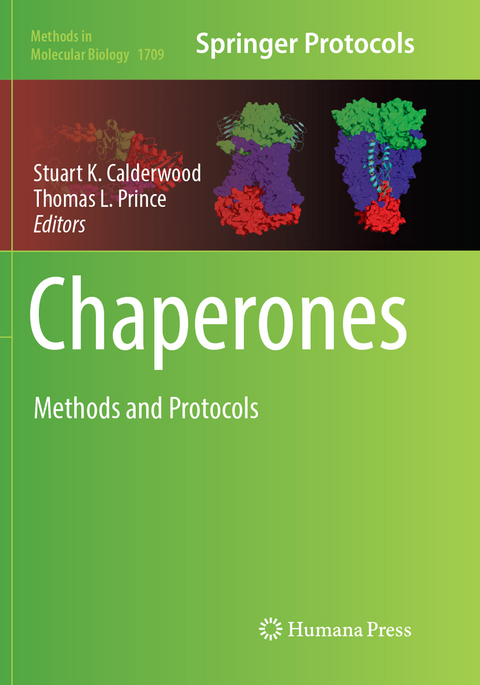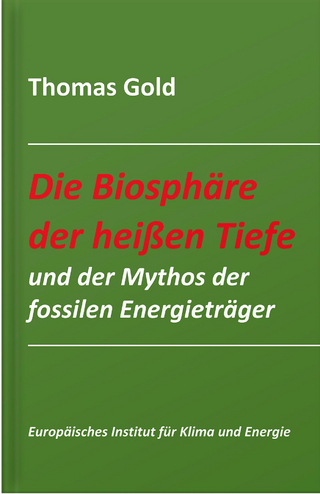
Chaperones
Humana Press Inc. (Verlag)
978-1-4939-8498-5 (ISBN)
Authoritative and practical, Chaperones: Methods and Protocols aims to ensure successful results in the further study of this vital field.
Targeted Deletion of Hsf1, 2 and 4 Genes in Mice.- Role of Heat Shock Factors in Stress-induced Transcription.- Monitoring of the Heat Shock Response with a Real-time Luciferase Reporter.- Quantitative Profiling of Chaperone/client Interactions with LUMIER Assay.- Measurement of chaperone-mediated effects on Polyglutamine Protein Aggregation by the Filter Trap Assay.- Fluorescent-linked Enzyme Chemoproteomic Strategy (FLECS) for Identifying HSP70 Inhibitors.- A High-throughput Screen for Inhibitors of the Hsp90-Chaperone Machine.- Primary Colorectal Cells Culture as a Translation Research Model.- Cell Death and Survival Assays.- Detecting the Potential Pharmacological Synergy of Drug Combination by Viability Assays In Vitro0pt;">.- nt-size: 12.0ptProteomic Profiling of Hsp90 Inhibitors.- Analysis of HspB1 (Hsp27) Oligomerization and Phosphorylation Patterns and its Interaction with Specific Client Polypeptides.- Nucleotide Exchange Factors for Hsp70 Chaperones.- Determination of Hsp90Activity through Activation of Glucocorticoid Receptors in Yeast.- Bacterial Hsp90 ATPase Assays.- Detecting Post-translational Modifications of Hsp90.- Chromatin Immunoprecipitation (ChIP) of Heat Shock Protein 90 (Hsp90).- background-image: initial; background-position: initial; background-size: initial; background-repeat: initial; background-attachment: initial; background-origin: initial; background-clip: initial; font-size: 12pt; font-family: "Times New Roman", serif; color: rgb(33, 33, 33);">A Workflow Guide to RNA-seq Analysis of Chaperone Function and Beyond.- Computational Modeling of the Hsp90 Interactions with Cochaperones and Small Molecule Inhibitors.- Computational Analysis of the Chaperone Interaction Networks.- Immunohistochemistry of Human Hsp60 in Health and Disease: From Autoimmunity to Cancer.- Immunohistochemical and Flow Cytometric Analysis of Intracellular and Membrane-bound Hsp70, as a Putative Biomarker of Glioblastoma Multiforme, using the cmHsp70.1 MonoclonalDetection and Analysis of Extracellular Hsp90 (eHsp90).- Molecular Chaperone Receptors.- Creation of Recombinant Chaperone Vaccine using Large Heat Shock Protein for Antigen-targeted Cancer Immunotherapy.- A Novel Heat Shock Protein 70-based Vaccine Prepared from DC-Tumor Fusion Cells.- Hsp70: A Cancer Target Inside and Outside the Cell.- Evidence for Hsp90 Cochaperones in Regulating Hsp90 Function and Promoting Client Protein Folding.- Clinical Evaluation and Biomarker Profiling of Hsp90 Inhibitors.n>ttom:.0001pt;line-height: normal;mso-layout-grid-align:none;text-autospace:none">
| Erscheint lt. Verlag | 5.9.2018 |
|---|---|
| Reihe/Serie | Methods in Molecular Biology ; 1709 |
| Zusatzinfo | 36 Illustrations, color; 33 Illustrations, black and white; XIX, 445 p. 69 illus., 36 illus. in color. |
| Verlagsort | Totowa, NJ |
| Sprache | englisch |
| Maße | 178 x 254 mm |
| Themenwelt | Naturwissenschaften ► Biologie ► Biochemie |
| Schlagworte | Heat shock proteins • mouse model • Protein Folding • Proteome • transcription factors |
| ISBN-10 | 1-4939-8498-5 / 1493984985 |
| ISBN-13 | 978-1-4939-8498-5 / 9781493984985 |
| Zustand | Neuware |
| Informationen gemäß Produktsicherheitsverordnung (GPSR) | |
| Haben Sie eine Frage zum Produkt? |
aus dem Bereich


